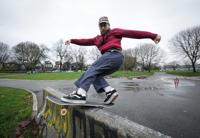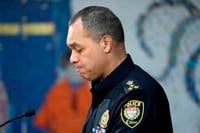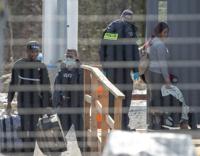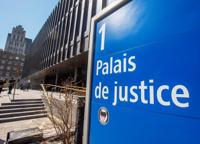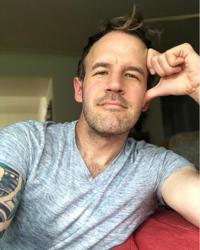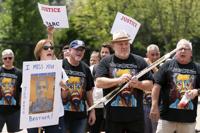WINNIPEG - Indigenous leaders are "dispelling the narrative" a search of a Winnipeg-area landfill for the remains of two First Nations women is unsafe after Manitoba's premier refused to fund the search due to health and safety risks.
"To say this can't be done safely is not accurate. It can be done with the necessary precautions and necessary training of those who would be involved," Long Plain First Nation Chief Kyra Wilson said Monday.
Wilson, along with the Assembly of Manitoba Chiefs, the families of Morgan Harris and Marcedes Myran and forensics experts, spoke with reporters Monday to urge Premier Heather Stefanson to reconsider her decision to oppose a search of the privately run Prairie Green Landfill, north of Winnipeg.
"Governments cannot allow (Harris and Myran) to just be added to the staggering statistics of missing and murdered Indigenous women and girls in this country," said Grand Chief Cathy Merrick of the Assembly of Manitoba Chiefs.
"They are not garbage, yet they are being treated like garbage - left at a landfill site."
A federally funded study said a search of the landfill is feasible, although toxic materials and asbestos pose a risk. An Indigenous-led committee determined the search could take up to three years and cost up to $184 million without a guarantee of success.
However, experts consulted for the study said Monday risks can be mitigated and the search can be done safely.
Kris Dueck, with Alberta-based Rocky Mountain Forensic Consulting, said the committee relied on past data and searches to develop the best approach to safely recover the remains of Harris and Myran.
"It's pretty clear to most who have read the study that risks can be mitigated and the search can be conducted safely. Any argument that would oppose those findings, in our opinion, aren't necessarily based in fact," he said.
Experts referred to previous cases where landfills were mined to determine the best methodology for a successful and safe search, including the search of serial killer Robert Pickton's pig farm in British Columbia and a similar landfill search in 2010 in Ontario.
The study suggests material and waste from the area at Prairie Green where it is believed Harris's and Myran's remains are can be transferred to a conveyor belt where it will be searched by trained individuals.
Forensic anthropologist Emily Holland said the method would result in a highly controlled search and that specific protective measures can be put into place to address all the potential hazards that are associated with working with the kind of material presented.
"We designed a method to have the highest probability of recovery."
Stefanson's office said in a statement the province will continue to offer supports to the families and would work with all levels of government on building a memorial to honour the victims.
"There is no guarantee of finding remains, and immediate and long-term health and safety risks are real and cannot be ignored. We must preserve the integrity of the justice proceedings," a spokesperson wrote.
Holland said no one from the province has spoken with her about safety concerns.
"The final report was not meant to be the end of a conversation, but rather to help continue to facilitate one," she said.
Protesters have been blocking a road to the city-run Brady Road landfill for more than a week to demand the search of Prairie Green proceed.
A judge granted a temporary injunction to end the blockade, but police have yet to enforce it.
"The Winnipeg Police Service is not in a position to discuss details of our operations, but our intent is to achieve a peaceful resolution," spokeswoman Ally Siatecki said in a statement.
Members of Harris's family have said they plan to stay at the Brady Road landfill and are also setting up another gathering spot for supporters outside the Canadian Museum for Human Rights.
Supporters outside the province have been adding their voices to the calls to search the landfill.
Red dresses were laid on the lawn of Parliament Hill on Monday while photos of missing and murdered Indigenous women and girls were placed beside them.
Supporters at the Ottawa rally pleaded for accountability from the provincial and federal governments.
"If they don't want to help us, they need to step down," said Bridget Tolley, the founder of the advocacy group Families of Sisters in Spirit.
Jeremy Skibicki has been charged with first-degree murder in the deaths of Harris and Myran.
He also been charged for first-degree murder in the death of Rebecca Contois, whose remains were found last year at the Brady Road landfill and an unidentified woman Indigenous leaders are calling Mashkode Bizhiki'ikwe or Buffalo Woman, whose remains have not been found.
New Democrat MP Leah Gazan is calling for "international oversight" into what she said is the failure of governments to search for the slain women in a submission to the United Nations Expert Mechanism on the Rights of Indigenous Peoples, which consists of seven independent experts.
"The continued inaction and passing of the buck between jurisdictions is sadly typical of how the crisis of missing and murdered Indigenous women, girls and two-spirit is neglected by all levels of government," said the six-page letter addressed to the experts.
Crown-Indigenous Relations Minister Marc Miller has criticized Stefanson's decision to oppose a search, saying the province is shirking its jurisdictional responsibilities.
— With files from Steve Lambert in Winnipeg and Alessia Passafiume in Ottawa.
This report by Ďă¸ŰÁůşĎ˛ĘąŇĹĆ×ĘÁĎ was first published July 17, 2023.




